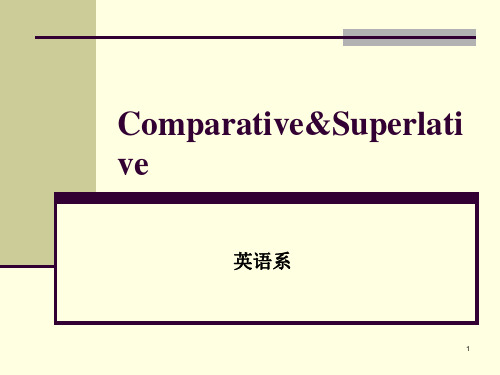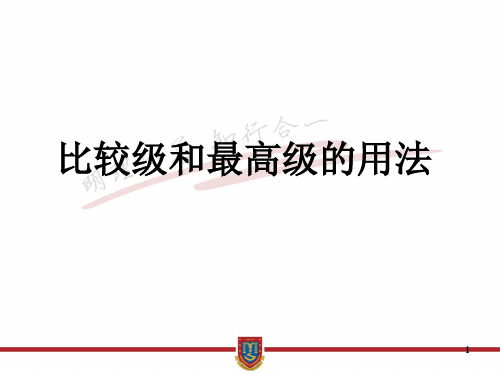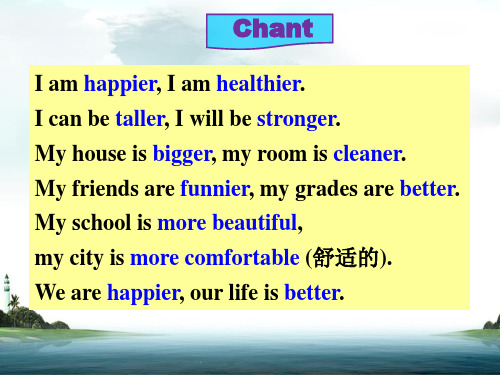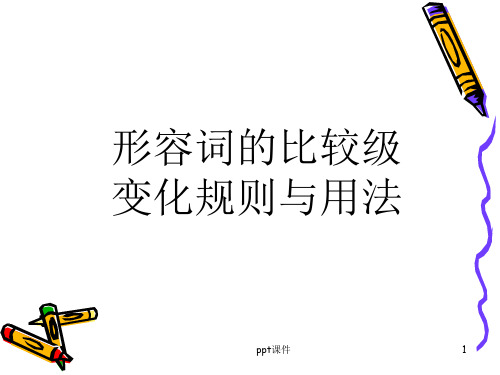比较级PPT
合集下载
形容词比较级ppt课件

个城市的生活成本最低。
表示程度或数量的变化
总结词
描述事物在程度或数量上的变化。
详细描述
形容词比较级可以用于描述事物在程度或数量上的变化, 强调某个属性在某种程度上有所增加或减少。例如,“随 着时间的推移,他的英语水平逐渐提高。”
示例
随着年龄的增长,他的身高逐渐增加。
04 形容词比较级的特殊用法
只用于某些形容词的比较级
某些形容词的比较级有特殊的表达方式,如"more"和"less",它们通常用于描述数 量、程度或程度差异。例如,"more beautiful"表示更加美丽,"less difficult"表示 较为容易。
还有一些形容词的比较级形式在口语和书面语中有所不同,如"happier"和"more happy",前者是口语中的比较级形式,后者是书面语中的比较级形式。
。”
示例
我喜欢苹果,因为它们比橙子更 甜。
表示三个或更多事物之间的比较
01
总结词
确定三个或更多事物之间的相对优劣。
02
详细描述
形容词比较级可以用于比较三个或更多事物,以确定它们之间的相对优
劣。例如,“这三个苹果中,这个最甜,那个最脆,而这染最轻,那个城市的交通最便利,而这
THANKS FOR WATCHING
感谢您的观看
选择题
01
A. smaller
02
B. largest
03
C. smallest
04
D. biggest
填空题
填空题1
The _____(big)of all the cities in our country is Beijing.
英语比较级的用法ppt课件

in her class.
15
但要注意比较的范围,如果主语属 于“than”后面的范围中的一部分, 就一定要使用else或other,如:
He is taller than any other boy in his class (对比:He is taller than any girls.)
I have never seen a taller man. (=He is the tallest man I have ever seen.)
(2) than any other, than anyone else, than any of the other+ …….等结构,如:
He runs faster than anyone else in his school. She plays the guitar better than any of the others
他不过是个孩子, 所以我根本不把他当回事.
He is no more than a child, so I don’t take him too
2s)ernioumsloyr.e... than.../not any more... than...表示前者和后者 一样都不……
杰克和约翰谁都不努力
Jack works no harder than John.
这本书和那本书都没有趣.
This book is no more interesting than that one.
10
三、比较级特殊用法:
(五)、 not more than和not more... than…的用法
1) not more than+数词,“至多,不超过” 教室里最多有10个学生. There are not more than ten students in the classroom.
15
但要注意比较的范围,如果主语属 于“than”后面的范围中的一部分, 就一定要使用else或other,如:
He is taller than any other boy in his class (对比:He is taller than any girls.)
I have never seen a taller man. (=He is the tallest man I have ever seen.)
(2) than any other, than anyone else, than any of the other+ …….等结构,如:
He runs faster than anyone else in his school. She plays the guitar better than any of the others
他不过是个孩子, 所以我根本不把他当回事.
He is no more than a child, so I don’t take him too
2s)ernioumsloyr.e... than.../not any more... than...表示前者和后者 一样都不……
杰克和约翰谁都不努力
Jack works no harder than John.
这本书和那本书都没有趣.
This book is no more interesting than that one.
10
三、比较级特殊用法:
(五)、 not more than和not more... than…的用法
1) not more than+数词,“至多,不超过” 教室里最多有10个学生. There are not more than ten students in the classroom.
比较级最高级PPT课件

.
5
5) 多音节词和部分双音节词在词前加more 。如: delicious – more delicious
interesting – more interesting
important—more important
.
6
carefully---more carefully quickly---more quickly slowly---more slowly easily--- more easily
+est。 如:
big—bigger—biggest thin—thinner—thinnest
fat—fatter—fattest hot—hotter—hottest
e. 多音节和部分双音节形容词,需在原级前+more
构成比较级,+ most 构成最高级。如:
important—more important—most important
The Comparative Superlative Degrees of Adjectives & Adverbs
形容词和副词 比较级和最高级
.
17
形容词和副词比较级和最高级构成 (规则变化)
单音节词在词尾比较级 加- er或最高级加- est
以e结尾的词,只需加 -r 或-st
cwthaaelrlaemfpritn,-a,yetlcalo,olnulledincs,gets,,mhsiaagflhle,
Grammar Focus
(二)形容词的比较级和最高级 comparatives and superlatives with adj. and adv.
.
1
short - shorter small - smaller
比较级和最高级归纳总结PPT演示课件

13
4. 使用形容词比较级时需注意以下几点: 1) than后面接代词时, 一般要用主格形式, 但在口语中也可使用宾格形式。 如:
My brother is taller than I / me. 2) 当需要表示一方超过另一方的程度时, 可以用much, a lot, a little, a bit, even, still 等来修饰形容词比较级。注意: 比较级不 能用very, so, too, quite等修饰。如:
比较级和最高级的用法
1
规则变化 1) 一般情况下,单音节或双音节的形容
词/副词比较级+er, 最高级+est。如: clever — cleverer — cleverest few — fewer — fewest small — smaller — smallest 等。
2
2) 以e结尾的词,比较级+r,最高级+st 即可。 如:
莉莉骑车像老太太一样慢。 They picked as many apples as the farmers . 他们摘的苹
果和农民一样多。
9
表示第一个人比不上第二个人时,使用句型:
主语A + 谓语动词(否定式) + as / so + 形容词/副词原级 + as +B
He is not so / as excited as his younger sister. 他没他妹妹那么兴奋。 Lily did not ride her bike so / as slowly as an old lady. 莉莉骑车不像老太太那样慢。 They didn’t pick so / as many apples as the farmers (did). 他们摘的苹果不如农民多。
4. 使用形容词比较级时需注意以下几点: 1) than后面接代词时, 一般要用主格形式, 但在口语中也可使用宾格形式。 如:
My brother is taller than I / me. 2) 当需要表示一方超过另一方的程度时, 可以用much, a lot, a little, a bit, even, still 等来修饰形容词比较级。注意: 比较级不 能用very, so, too, quite等修饰。如:
比较级和最高级的用法
1
规则变化 1) 一般情况下,单音节或双音节的形容
词/副词比较级+er, 最高级+est。如: clever — cleverer — cleverest few — fewer — fewest small — smaller — smallest 等。
2
2) 以e结尾的词,比较级+r,最高级+st 即可。 如:
莉莉骑车像老太太一样慢。 They picked as many apples as the farmers . 他们摘的苹
果和农民一样多。
9
表示第一个人比不上第二个人时,使用句型:
主语A + 谓语动词(否定式) + as / so + 形容词/副词原级 + as +B
He is not so / as excited as his younger sister. 他没他妹妹那么兴奋。 Lily did not ride her bike so / as slowly as an old lady. 莉莉骑车不像老太太那样慢。 They didn’t pick so / as many apples as the farmers (did). 他们摘的苹果不如农民多。
比较级和最高级课件讲解(共12页)

。
1.Which do you like _b_e_t_te_r_(well),apples or oranges? 2.Who is __o_ld_e_r_(old),Jim or Tom ? 3.Jack is running f_a_s_te_r_ and _f_a_st_e_r_(fast) . 4.Our country is becoming _m_o_r_e__and _m_o_r_e_b__ea_t_i_fu_l(beautiful). 5.He is the tallestt_h_e_t_a_l_le_s_t(tall) of the three boys.
15 delicious more delicious most delicious
16 young 17 far
18 slow 19 thin 20 wet 21 rich 22 fat
younger farther further slower thinner wetter richer fatter
youngest farthest furthest slowest thinnest wettest richest fattest
as 原级 as 原级的用法 not as (so) 原级as
数词times as原级as
• 汉译英 • 北京和上海一样美.
Beijing is as beautiful as Shanghai.
• 北京没有上海大. Beijing is not so big as Shanghai.
• 吉姆和汤姆一样高. Jim is as tall as Tom.
• 他没有汤姆聪明. He is not as clever as Tom.
八年级(上)比较级ppt课件

形容词和副词的 比较级
1
一、形容词和副词的概念
形容词:修饰名词或代词,表示性质,特征 或属性一种词类。 它在句中作定语、表语和宾语补足语。 副词:用来修饰动词、形容词及其他副词。 副词在句中多作状语。
2
二、形容词和副词的用法
①形容词作定语一般放在被修饰的名词之前。 如: a new book, two big trees
This pen is much better than that one.
Tom is a little shorter than his friend Jim.
原级的修饰
原级前面可以用very, too, so, quite等修饰
very tall, too hot, so cold, quite interesting
15
2、“A和B哪一个更···?” Which/Who +is/行为动词+比较级, A or B?
Which is more popular, the TV or the movie? Who studies harder, Jim or Jack?
3、“越来越···” 比较级+and+比较级(单音节词) more and more +原级(多音节词) The weather is getting colder and colder. He runs faster and faster. Our hometown is more and more beautiful. Shopping online is more and more popular.
She is as beautiful as her mother. The book is as new as that one. The question is not as / so difficult as that one. My bike is not as / so big as yours. 注意: The question is not so difficult as that one. =The question is easier than that one.
1
一、形容词和副词的概念
形容词:修饰名词或代词,表示性质,特征 或属性一种词类。 它在句中作定语、表语和宾语补足语。 副词:用来修饰动词、形容词及其他副词。 副词在句中多作状语。
2
二、形容词和副词的用法
①形容词作定语一般放在被修饰的名词之前。 如: a new book, two big trees
This pen is much better than that one.
Tom is a little shorter than his friend Jim.
原级的修饰
原级前面可以用very, too, so, quite等修饰
very tall, too hot, so cold, quite interesting
15
2、“A和B哪一个更···?” Which/Who +is/行为动词+比较级, A or B?
Which is more popular, the TV or the movie? Who studies harder, Jim or Jack?
3、“越来越···” 比较级+and+比较级(单音节词) more and more +原级(多音节词) The weather is getting colder and colder. He runs faster and faster. Our hometown is more and more beautiful. Shopping online is more and more popular.
She is as beautiful as her mother. The book is as new as that one. The question is not as / so difficult as that one. My bike is not as / so big as yours. 注意: The question is not so difficult as that one. =The question is easier than that one.
初中英语比较级(共19张PPT)

The group became more and more popular.
5). “Which / Who is + 比较级…?” 比较A、B两事物, 问其中哪一个较……时用此句型。 如: Which T-shirt is nicer, this one or that one? Who is more active, Mary or Kate? Which one is more popular among students, going to concerts or going to movies?
Gong Hanlin is _th__in_n_e_r_ _th_a_n__ Liu Huan. Liu Huan sings _b_e_t_te_r_ _th_a_n__ Gong Hanlin.
Gao Yuanyuan is as _b_e_a_u_t_if_u_l (漂亮) as Sun Li. Sun Li works as _h_a_r_d_ (努力) as Gao Yuanyuan.
1. My brother is two years ___o__ld__e_r__(old) than me. 2. Tom is as ___f_a_t___(fat) as Jim.
3. Is your sister _y_o__u_n_g_e_r__(young) than you?
Yes, she is.
12.Who gets up _________(early), Tim or Tom?
13._____the girls egaetrulipe_r______ (early) than the boys?
NoD, tohey______. earlier
5). “Which / Who is + 比较级…?” 比较A、B两事物, 问其中哪一个较……时用此句型。 如: Which T-shirt is nicer, this one or that one? Who is more active, Mary or Kate? Which one is more popular among students, going to concerts or going to movies?
Gong Hanlin is _th__in_n_e_r_ _th_a_n__ Liu Huan. Liu Huan sings _b_e_t_te_r_ _th_a_n__ Gong Hanlin.
Gao Yuanyuan is as _b_e_a_u_t_if_u_l (漂亮) as Sun Li. Sun Li works as _h_a_r_d_ (努力) as Gao Yuanyuan.
1. My brother is two years ___o__ld__e_r__(old) than me. 2. Tom is as ___f_a_t___(fat) as Jim.
3. Is your sister _y_o__u_n_g_e_r__(young) than you?
Yes, she is.
12.Who gets up _________(early), Tim or Tom?
13._____the girls egaetrulipe_r______ (early) than the boys?
NoD, tohey______. earlier
比较级 ppt课件

ppt课件
12
练习
.根据句意,用所给词的适当形式填空。 1. Traveling by air is _______ than by train. (expensive) 2. Which river is ________, the Yangtze River or the Yellow River? (long) 3. The sick man is getting ________. (ill) 4. Spring is the _______ time to plant trees. (good) 5. We are sure Hong Kong will be even _________ tomorrow. (good) 6. Which play of the two is _________? (interest)
Eg: China is bigger than US. I am shorter than you. Now ,I feel better than before.
ppt课件
8
1. 最高级用于三者以上比较,形容词的结构形式是 “定冠词+形容词最高级+名词+表示范围的短语或 从句”(如all, of all, of the tree, in the world, that has ever taken place等)
eg;The earlier you start, the more quickly you’ll finish it.
ppt课件
11
四、“the +比较级+ of the two”结构表示 “两者当中 较……的”,通常要在形容词比较级前面加the, 还可以省去 形容词后面的名词。
eg:Which is the larger of the two countries, Canada or Australia?
比较级和最高级通用课件

比较级和最高级通用 课件
目录
• 比较级和最高级的定义 • 比较级和最高级的规则 • 比较级和最高级的用法 • 比较级和最高级的练习 • 比较级和最高级的常见错误 • 比较级和最高级的实际应用
CHAPTER 01
比较级和最高级的定义
比较级的定义
比较级的定义
用法
比较级是形容词和副词的一种形式, 用于描述事物之间的相对差异。在英 语中,大多数形容词和副词都有比较 级的形式。
在英语中,最高级的形式有误,例如“bestest”而不是 “best”。
忽略最高级的规则
在构成最高级时,没有遵循正确的规则,例如“happy” 的最高级应该是“happiest”而不是“happyist”。
最高级的语境不当
在不适合使用最高级的语境中使用了最高级,例如在“She is the tallest person in the room.”(她是
房间里最高的人。)
CHAPTER 02
比较级和最高级的规则
比较级的变化规则
01
02
03
规则变化
在形容词和副词后面加“er”即可形成比较级,如 “beautiful”变为 “more beautiful”。
不规则变化
CHAPTER 05
比较级和最高级的常见错误
比较级常见的错误
在此添加您的文本17字
误用比较级的形式:在英语中,比较级的形式有误,例如 “more better”而不是“more
在此添加您的文本16字
better”。
在此添加您的文本16字
忽略比较级的规则:在构成比较级时,没有遵循正确的规 则,例如“happy”的比较级应该是“happier”而不是 “happyier”。
目录
• 比较级和最高级的定义 • 比较级和最高级的规则 • 比较级和最高级的用法 • 比较级和最高级的练习 • 比较级和最高级的常见错误 • 比较级和最高级的实际应用
CHAPTER 01
比较级和最高级的定义
比较级的定义
比较级的定义
用法
比较级是形容词和副词的一种形式, 用于描述事物之间的相对差异。在英 语中,大多数形容词和副词都有比较 级的形式。
在英语中,最高级的形式有误,例如“bestest”而不是 “best”。
忽略最高级的规则
在构成最高级时,没有遵循正确的规则,例如“happy” 的最高级应该是“happiest”而不是“happyist”。
最高级的语境不当
在不适合使用最高级的语境中使用了最高级,例如在“She is the tallest person in the room.”(她是
房间里最高的人。)
CHAPTER 02
比较级和最高级的规则
比较级的变化规则
01
02
03
规则变化
在形容词和副词后面加“er”即可形成比较级,如 “beautiful”变为 “more beautiful”。
不规则变化
CHAPTER 05
比较级和最高级的常见错误
比较级常见的错误
在此添加您的文本17字
误用比较级的形式:在英语中,比较级的形式有误,例如 “more better”而不是“more
在此添加您的文本16字
better”。
在此添加您的文本16字
忽略比较级的规则:在构成比较级时,没有遵循正确的规 则,例如“happy”的比较级应该是“happier”而不是 “happyier”。
比较级PPT

2、比较级:使用形容词或副词比较级形式,
表示A与B 二者相比哪一个更……。 主要用于A … than B 结构。 Eg. 1) Jim is taller than Mike. 2)
Jim works harder than Mike.
比较级用法扩展
比较级用法扩展
1)比较级前面可以有much, a little, a lot, even等修 饰语。 This book is much better than that one. 好得多 2)比较级+比较级,表示越来越…… hotter and hotter 越来越热 more and more beautiful 越来越漂亮 3) than 后面的人称代词用主格或宾格都可以。 He is taller than I (am). He is taller than me.
形容词或副词比较级和最高级的构成
单音节词和少数双音节词词尾加er/est变为比较级/最高 级。加er/est方法与动词变过去式加ed方法相同。 Eg. tall – taller/tallest nice – nicer/nicest big – bigger/biggest easy – easier/easiest clever – cleverer/cleverest (clever双音节) 多音节词和一些双音节词在该词前加more/ most变为比 较级/最高级。以ly结尾的副词除early以及不规则变化外, 也应加more/most。 Eg. interesting – more/most interesting careful – more/most careful slowly – more/most slowly
Exercises: 请将下列词变成比较级和最高级
比较级最高级课件-PPT

1.表示两者之间的选择, 可用“Which/Who … + 比较,…or…?”.
Who runs faster, he or she?
2.表示两者之间的比较,通常用连词 than 引导, 表示“更······一些”.
He runs faster than she.
3.much/far/a lot, even ,still ,a little/a bit … 修饰比较级,表示程度.
6. 表示不及另一方时,用“less+原级+than…” (双音节和多音节词)
He is healthier than she.
She is less healthy than he.
1.比较级 + and +比较级
越来越…
2.the+比较级 , the + 比较级 越…, 越 …
1.The girl becomes m__o_r_e_a_n_d__m__o_r_e_b_e_a_u_t_if_u_l_. (越来越漂亮)
A. taller B. tall C. the tallest D. tallest 6. Li Lei is ____ older than Lucy.
A. quite B. very C. much D. more
Class exercises
1.Who is _______(quiet), Mary or Jane? 2.Lucy is much _____ (smart) than Lily. 3.Miss Du is a little ________ (outgoing)
A: tall short
taller tall
tallest
形容词的比较级和最高级ppt课件

This book is more interesting than that one.(这本书比那本书更有趣。)
表示一方随另一方的程度而变化,用“the 比较级,t…
The more you eat,the fatter you will become.(你吃得越多,就会变得越胖。)
表示一方超过另一方的程度,用“比较级+than+an…
当最高级前面有物主代词时,不再加the。例如
This is my best friend. 这是我最好的朋友。
当一个人或物与其他人或物进行比较时,可以用“比较级+…
Shanghai is larger than any other city in China. 上海是中国最大的城市。
04 比较级与最高级 的转换
最高级
单音节和部分双音节形容词一般 在词尾加-est构成最高级;多音 节形容词和部分双音节形容词则
在词前加most构成最高级。
特殊变形
部分形容词的比较级和最高级形 式不规则,需要单独记忆。
02 比较级详解
比较级的构成方式
01
02
03
04
05
一般在词尾加-er 以e结尾的形容词 以辅音字母+y结 重读闭音节单词
【解析】句意:这个盒子比那个重。根据句中的than可知,此处应用形容词的比 较级形式,heavy的比较级是heavier,故填heavier。
典型例题解析
2. 题目:用所给词的正确形式填空。
Of all the students in our class, Li Ming is _______ (tall). (tall/tallest)
表示“最高程度”的形容词,如excellent,ex…
表示一方随另一方的程度而变化,用“the 比较级,t…
The more you eat,the fatter you will become.(你吃得越多,就会变得越胖。)
表示一方超过另一方的程度,用“比较级+than+an…
当最高级前面有物主代词时,不再加the。例如
This is my best friend. 这是我最好的朋友。
当一个人或物与其他人或物进行比较时,可以用“比较级+…
Shanghai is larger than any other city in China. 上海是中国最大的城市。
04 比较级与最高级 的转换
最高级
单音节和部分双音节形容词一般 在词尾加-est构成最高级;多音 节形容词和部分双音节形容词则
在词前加most构成最高级。
特殊变形
部分形容词的比较级和最高级形 式不规则,需要单独记忆。
02 比较级详解
比较级的构成方式
01
02
03
04
05
一般在词尾加-er 以e结尾的形容词 以辅音字母+y结 重读闭音节单词
【解析】句意:这个盒子比那个重。根据句中的than可知,此处应用形容词的比 较级形式,heavy的比较级是heavier,故填heavier。
典型例题解析
2. 题目:用所给词的正确形式填空。
Of all the students in our class, Li Ming is _______ (tall). (tall/tallest)
表示“最高程度”的形容词,如excellent,ex…
- 1、下载文档前请自行甄别文档内容的完整性,平台不提供额外的编辑、内容补充、找答案等附加服务。
- 2、"仅部分预览"的文档,不可在线预览部分如存在完整性等问题,可反馈申请退款(可完整预览的文档不适用该条件!)。
- 3、如文档侵犯您的权益,请联系客服反馈,我们会尽快为您处理(人工客服工作时间:9:00-18:30)。
8. He was (worse) than his brother.
9. Of all the boys ,he reads (best.) 10. Of all the boys, he is the (best.) 11. That plane flew (high) that day.
12. That plane is (high ) in the sky now. 13. A (straight ) line is the shortest between 2 points. 14. Stand (straight).
angry
popular
---
quickly
good
---
bad
--
worse, worst
形容词或副词各比较等级的基本用法
1、原级:使用形容词或副词原形,表示
A与B一样(或不一样)……。 主要用于A as/(not so) … as B 结构。 Eg. 1) Jim is as tall as Mike. Jim is not so tall as Mike. 2)
Jim works as hard as Mike. Jim doesn’t work so hard as Mike.
2、比较级:使用形容词或副词比较级形式,
表示A与B 二者相比哪一个更……。 主要用于A … than B 结构。 Eg. 1) Jim is taller than Mike.
2)
补充:
China is one of the most beautiful countries. The Yellow River is the second longest river in China.
Exercises: 根据所给提示词填空。
1. My house is _______ larger (large) than Jim’s.
形容词(adj.)和副词(adv.)
形容词:用于修饰名词或代词,描述被修
饰成分的性质、特征、状态或属性等。 Eg. This is a good book. (修饰名词book) She is beautiful.(修饰代词she)
副词:主要用于修饰动词、形容词和副词,
描述被修饰成分的特征或状态。 Eg. Jim plays basketball well.(修饰动词play) She is very beautiful.(修饰形容词beautiful) Jim plays basketball very well.(修饰副词well)
22. She was very well when I (last ) saw her. 23. The train was ten minutes (late). 24. He arrived home (late) last night and he got up late this
2) Jim works (the) hardest of all the boys.
最高级用法扩展
最高级用法扩展
形容词最高级前的the在以下几种情况下可以省略: 1) 该形容词前有物主代词或名词所有格。 He is my/Jim’s best friend. 2) 比较含义模糊。 We are busiest on Monday. This is a most interesting book. 这里的most相当于very。
2. Today is much _______ warmer (warm) than yesterday. more interesting 3. Which book is _________(interesting), this one or that one? better (good) than me at English. 4. Kate is _______
new-newer-newest
low-lower-lowest
high-higher-highest
slow-slower-slowest
2. 以不发音 的元音“e”结尾的形容词, 加er或est. close-closer-closest fine-finer-finest strange-stranger-strangest large-larger-largest
Exercises: 请将下列词变成比较级和最高级
bright long late wide -----
brighter, brightest longer, longest
later, latest wider, widest angrier, angriest more/most popular more/most quickly better, best
the tallest (tall) boy in your class? 5. Who is ________
fastest 6. Mike runs (the) _________(fast) of all the students. 7. I have _______ more (much) money than you. 8. Yesterday was my ________ happiest (happy) day in my life. strong (strong) as me. 9. My brother is not so ________ shorter (short) of the two men . 10. Mr Smith is the ________
big-bigger-biggest
fat-fatter-fattest hot-hotter-hottest
thin-thinner-thinnest
wet-wetter-wettest red-redder-reddest
形容词或副词比较级和最高级的构成
1)规则变化
单音节词和少数双音节词词尾加er/est变为比较级/最高 级。加er/est方法与动词变过去式加ed方法相同。 Eg. tall – taller/tallest nice – nicer/nicest big – bigger/biggest easy – easier/easiest clever – cleverer/cleverest (clever双音节) 多音节词和一些双音节词在该词前加more/ most变为比 较级/最高级。以ly结尾的副词除early以及不规则变化外, 也应加more/most。 Eg. interesting – more/most interesting careful – more/most careful slowly – more/most slowly
wide-wider-widest
nice-nicer-nicest
white-whiter-whitest
late-later-latest
3.以辅音字母加“y”结尾的形容词,先把“y”变为“i”,再加er 或est. angry-angrier-angriest busy-busier-busiest
Jim works harder than Mike.
比较级用法扩展
比较级用法扩展
1)比较级前面可以有much, a little, a lot, even等修 饰语。 This book is much better than that one. 好得多 2)比较级+比较级,表示越来越…… hotter and hotter 越来越热 more and more beautiful 越来越漂亮 3) than 后面的人称代词用主格或宾格都可以。 He is taller than I (am). He is taller than me.
15. He always speaks in a (low ) voice.
16. He is a clever businessman.He always buys (low ) and sells high. 17. At the end of the streeet , there is a (low ) wall. 18. We didn`t go (far ) because we knew that famous place was too (far ) away.
形容词或ห้องสมุดไป่ตู้词比较级和最高级的构成
2)不规则变化
good/well – better, best bad/badly/ill – worse, worst many/much – more, most little – less, least * old – older, oldest 年长的;老的;旧的 elder, eldest(亲戚关系中)年长的 * far – farther, farthest 远的 further, furthest 远的(有更加、进一步的含义) 补充说明: few – fewer, fewest friendly – friendlier, friendliest (adj.) more/most friendly often – more/most often
形容词和副词的比较等级
(假设A和B为进行比较的人或事物)
1、原级:使用形容词或副词原形,表示A与B一 样(或不一样)……。 2、比较级:使用形容词或副词比较级形式,表 示A与B二者相比哪一个更……。 3、最高级:使用形容词或副词最高级形式,表 示三者(或三者以上)相比哪一个最……。
形容词或副词比较级和最高级的构成
补充:
He is the taller of the two boys.
3、最高级:使用形容词或副词最高级形式,
表示三者(或三者以上)相比哪一个最……。 主要用于the … in/among/of +所包含人或事 物的数量≥3的集合短语结构。 Eg. 1) Jim is the tallest in our class.
